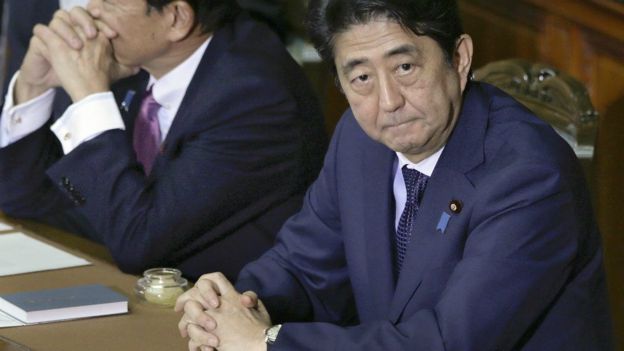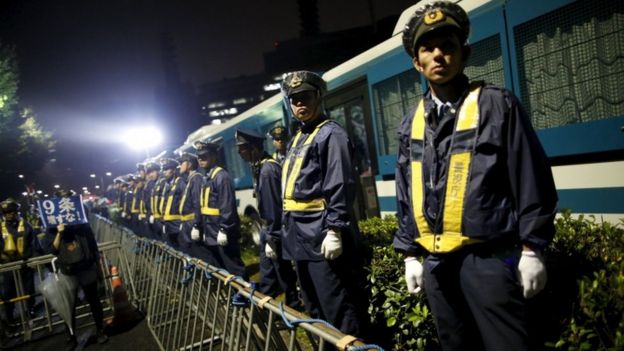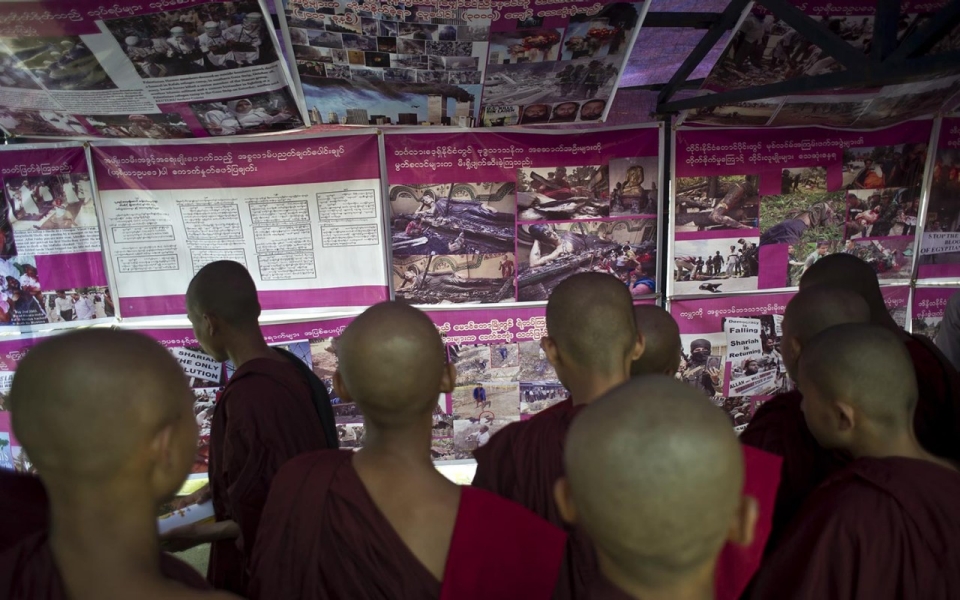China warns Japan over expanding military role abroad
China has said Japan is endangering peace in the region after it passed controversial laws expanding the role of its military abroad.
Japan should learn "profound lessons from history", China's defence ministry said after Japan's parliamentary vote.
The vote allows Japanese troops to fight overseas for the first time since the end of World War Two 70 years ago.
Tensions between China and Japan have escalated in recent months over a group of islands to which both lay claim.
The security laws were voted through Japan's upper house late on Friday, with 148 lawmakers voting in support and 90 against.
It followed nearly 200 hours of political wrangling, with scuffles breaking out at various points between the bills' supporters and opposition members attempting to delay the vote.
Reaction snapshot:
- "Japan's military stance has potentially become more dangerous... It is deplorable that [Prime Minister Shinzo] Abe, after acknowledging the mistake Japan had made over 70 years ago, is now choosing to repeat the same mistake" - China's Xinhua news agency
- The laws will add to "fears that an arms race could be sparked with China and its neighbours". Seoul will find it hard to boost security cooperation with Tokyo without "a frank apology" for Japan's actions in the past - South Korea's Hankyoreh newspaper
Compiled by BBC Monitoring
 EPA
EPA
The government says that the changes in defence policy are vital to meet new military challenges such as those posed from a rising China.
But China's defence ministry said on Saturday they "run counter to the trend of the times that upholds peace, development and co-operation", the Xinhua news agency reports.
"The move has breached the restrictions of Japan's pacifist constitution," the ministry added.
Many Japanese who opposed the bills - which prompted large public protests - were also attached to the pacifist provisions in the constitution that banned fighting overseas.
China also urged Japan to "heed the security concern" of its Asian neighbours and do more to promote regional peace and stability.
South Korea, which also has a tense relationship with Japan, has warned Tokyo not to exercise the new defence laws without its approval.
But the US, Japan's ally, and the UK have both welcomed the changes.
UK Foreign Secretary Philip Hammond said he looked forward to Japan "taking an increasingly active part in peacekeeping operations".
What is collective self-defence?
Japan's post-World War Two constitution bars it from using force to resolve international conflicts except in cases of self-defence.
The new security legislation allows Japan's military to mobilise overseas when these three conditions are met:
- when Japan is attacked, or when a close ally is attacked, and the result threatens Japan's survival and poses a clear danger to people
- when there is no other appropriate means available to repel the attack and ensure Japan's survival and protect its people
- use of force is restricted to a necessary minimum
Critics say the changes violate the pacifist constitution and could lead Japan into US-led wars abroad.
Supporters of the measures insist they are essential for the defence of Japan and its regional allies, and will permit greater involvement in peacekeeping activities around the world.
 Reuters
ReutersWhat kinds of military actions do the laws allow?
- Japan would be able to provide logistical support to South Korea if the North invaded, though Mr Abe has said it would still be against the constitution to send Japanese troops to fight on Korean soil.
- It would be legal for Japan to shoot down a North Korean missile headed for the US. Currently, they have to threaten Japan to justify shooting them down. North Korea is thought to be several years from being able to hit mainland US targets though.
- Military action to keep shipping lanes secure, such as minesweeping, even if in an active conflict zone, might be allowed if the restriction on shipping was severe enough to constitute a threat to Japan's survival.
- Armed involvement in hostage rescues would also become possible. In January 2013, 10 Japanese hostages were killed at the Amenas gas plant in Algeria.
- Regional limits on Japanese military support for US and other foreign armed forces would also be eliminated.
Critics have focused on what they say is ambiguity in how the principles of the legislation will be interpreted, and the possibility that future governments will interpret them more broadly.
